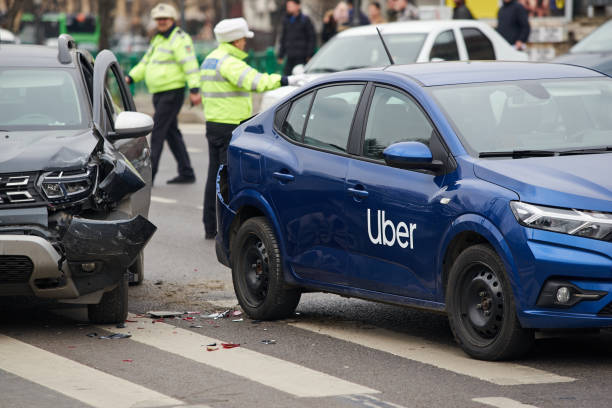Middletown Rideshare Accident Lawyer
Do you need a Middletown rideshare accident lawyer? If you or a loved one has been involved in an accident with an Uber, Lyft, or rideshare driver—whether as a passenger, another driver, or even a pedestrian—you have rights. Understanding these rights and navigating the complexities of rideshare accident claims requires the help of an experienced attorney. At Etemi Law, we are dedicated to helping victims of rideshare accidents receive the compensation they deserve.
Call us today at (203) 409-8424 for a


The Reality of Rideshare Accidents
Uber and Lyft have revolutionized transportation, providing millions of rides daily across the U.S. However, with the rise of these services, the number of rideshare-related accidents has also increased. Research from Rice University and the University of Chicago suggests that ridesharing services have contributed to a 2-3% increase in U.S. traffic fatalities since 2011, leading to up to 1,100 deaths annually.
Common Causes of Rideshare Accidents
Uber and Lyft drivers often operate under challenging conditions, increasing their risk of accidents. Some of the most common causes include:
- Distracted Driving – Relying on GPS, accepting ride requests, and managing passengers can divert a driver’s attention.
- Driver Fatigue – Many rideshare drivers work long hours or multiple jobs, leading to drowsy driving.
- Unfamiliar Routes – Navigating new areas can cause sudden stops or erratic driving behavior.
- Poor Vehicle Maintenance – Rideshare drivers are responsible for keeping their vehicles in good working condition, but lapses can lead to preventable accidents.
Connecticut Rideshare Laws and Regulations
Connecticut has strict laws governing rideshare companies and their drivers. These include:
- Mandatory Background Checks – Uber and Lyft must conduct background checks on all drivers, including a criminal record and driving history review.
- Vehicle Safety Requirements – Vehicles must pass inspections and meet specific safety criteria.
- Insurance Coverage – Rideshare companies must provide at least $1 million in liability coverage when drivers are transporting passengers.
- Driver Hour Limits – Uber and Lyft drivers can work a maximum of 14 consecutive hours and 16 hours in a 24-hour period to prevent fatigue-related accidents.
Who is Liable in a Rideshare Accident?
Determining liability in an Uber or Lyft accident can be complex, as multiple insurance policies may be involved. Our legal team at Etemi Law will investigate your case to establish liability and maximize your compensation.
If Another Driver is At Fault
- The at-fault driver’s insurance is the first line of compensation.
- If the at-fault driver is uninsured or underinsured, Uber/Lyft’s uninsured motorist coverage may apply.
If the Rideshare Driver is At Fault
- If the driver was logged into the app and waiting for a ride request, Uber/Lyft provides $50,000 per person/$100,000 per accident in bodily injury coverage.
- If the driver was transporting a passenger, Uber/Lyft provides $1 million in liability coverage.
- If the driver was off duty, their personal auto insurance applies.
Why You Need a Middletown Uber and Lyft Accident Lawyer
Rideshare accident cases involve multiple insurance companies and complicated liability issues. Insurance companies often try to minimize payouts, but with an experienced attorney from Etemi Law, you can fight for the full compensation you deserve.
Our legal team will: ✅ Investigate the accident thoroughly ✅ Obtain key evidence, including rideshare records and driver logs ✅ Negotiate aggressively with insurance companies ✅ Take your case to court if necessary
Contact Etemi Law Today
If you or a loved one has been injured in an Uber or Lyft accident, don’t wait. Protect your rights and get the compensation you deserve. Contact Etemi Law today for a free consultation.
📞 Call us at (203) 409-8424 💻 Visit us online to schedule your case review
As winter tightens over Middletown, rideshare pickups that thread Route 9 ramps and the River Road neighborhoods become riskier when black ice forms at dawn. Drivers and passengers relying on apps to get to Wesleyan University lectures or evening lab shifts find slip-and-slide merges where a routine short trip can turn into a crash scene. I look for how app GPS, surge patterns, and pickup staging at campus lots affect exposure and response times.
Black ice and leaf-slick patches near Wadsworth Falls State Park entrances or on side streets entering downtown change injury patterns: fractures from falls when exiting vehicles, whiplash in low-speed collisions, and head trauma when passengers slide across car seats. Cold also delays onsite first aid and can slow ambulances reaching Middlesex Hospital, making interfacility transfers from smaller local clinics more frequent during prolonged storms.
From a reporting stance I track how rideshare app timestamps, driver ratings, and GPS ping trails affect transport times to emergency care; calls that start near the riverfront often route responders through backup corridors, lengthening door-to-door time. Rehabilitation patterns follow too: patients discharged from a local emergency department commonly seek outpatient physical therapy in Middletown and sometimes require longer rehab when initial transport was delayed by winter road conditions.
My role is to illuminate patterns—how leaf fall, plow schedules, and early-morning black ice increase both collision risk and delayed care—so readers in Middletown know what to document and expect. Photograph vehicle positions, preserve app ride receipts and timestamps, and prioritize medical evaluation if symptoms appear after a rideshare incident; accurate records matter whether healing happens at a nearby clinic or requires coordinated transfers.
